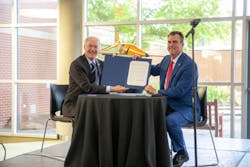Oklahoma, Arkansas creating Advanced Mobility R&D and Innovation hubs
Two governors of states in the heart of the American Oil Patch are uniting to work on creating a hub for e-mobility technologies of the future.
Oklahoma Gov. Kevin Stitt and Arkansas Gov. Asa Hutchinson announced plans for a national hub for advanced mobility. This would include work on drones, electric vehicles, battery manufacturing and logistics.
Partners with the states will be Tulsa Innovation Labs and Runway Group, the latter focused on bringing new technologies into northwest Arkansas. They will create new research and testing space and support local startups for advanced mobility sectors.
“Oklahoma had a legacy of leadership in aerospace, and I am thrilled with the innovation we are seeing in research and development in autonomous systems and advanced air mobility,” Gov. Stitt said in a statement. “I am proud of the work being done by our Aerospace and Autonomous systems Council, our universities, corporations and entrepreneurs around our great state in advanced mobility technologies. This partnership gives us the momentum we need for this region to lead the nation into the future of mobility.”
Leaders of the two states believe the initiatives could help create up to 55,000 new jobs in careers such as software engineering, cybersecurity analytics, drone piloting, vehicle maintenance and engineering. Projected earnings in advanced mobility are 50 percent higher compared to other industries in Arkansas and Oklahoma.
See our complete coverage of e-Mobility and Advanced Air Mobility in EnergyTech.com
Canoo gains boost with Walmart order of 4,500 eDeliveryvans
Rolls Royce all-electric Spirit of Innovation claims record 387-MPH in test flight
Fluence Energy contracts for Cube Battery Manufacturing in Utah
The two states are best known for legacy industries such as oil and gas and agriculture. However, fleet EV startup Canoo has made its manufacturing base in northeastern Oklahoma, while earlier this year California-based Envirotech Vehicles Inc. announced plans for a manufacturing center in eastern Arkansas.
Northwest Arkansas is one of the fastest growing regions in the U.S. over the past few decades and is home to the University of Arkansas, Walmart, J.B. Hunt, Tyson Foods and ArcBest Corp.
"I have seen enough of space-age mobility and technology in Arkansas to know that drones and autonomous vehicles are no longer the stuff of science fiction," Governor Hutchinson said. "Arkansas is rich with business and technology entrepreneurs who are fearless in their pursuit of the future. This partnership will accelerate the work on advanced mobility and further enhance our region's reputation as a leader in technological innovation."
Some analysts expect the autonomous vehicle market to grow ten-fold to more than $1 trillion globally by 2030.
A report last year from the Aerospace Industries Association and Deloitte predicted that the revenue for advanced air mobility in the U.S. would surprise $100 billion annually by 2035.
Oklahoma’s economy historically has been driven by oil and gas exploration, production and pipelining. Cushing, in the state’s center, is considered the “pipeline crossroads of the world.”
Arkansas ranks below Oklahoma in oil and gas plays, but it still has large producing formations such as the Smackover and Haynesville. It currently also has a robust aerospace sector with companies such as Lockheed Martin, Triumph Group, Envoy Air and others conducting activities in the state.
-- -- --
(Rod Walton, senior editor for EnergyTech, is a 14-year veteran of covering the energy industry both as a newspaper and trade journalist. Walton is a resident in northeastern Oklahoma and based out of Tulsa. He can be reached at [email protected]).
About the Author
Rod Walton, EnergyTech Managing Editor
Managing Editor
For EnergyTech editorial inquiries, please contact Managing Editor Rod Walton at [email protected].
Rod Walton has spent 17 years covering the energy industry as a newspaper and trade journalist. He formerly was energy writer and business editor at the Tulsa World. Later, he spent six years covering the electricity power sector for Pennwell and Clarion Events. He joined Endeavor and EnergyTech in November 2021.
Walton earned his Bachelors degree in journalism from the University of Oklahoma. His career stops include the Moore American, Bartlesville Examiner-Enterprise, Wagoner Tribune and Tulsa World.
EnergyTech is focused on the mission critical and large-scale energy users and their sustainability and resiliency goals. These include the commercial and industrial sectors, as well as the military, universities, data centers and microgrids. The C&I sectors together account for close to 30 percent of greenhouse gas emissions in the U.S.
He was named Managing Editor for Microgrid Knowledge and EnergyTech starting July 1, 2023
Many large-scale energy users such as Fortune 500 companies, and mission-critical users such as military bases, universities, healthcare facilities, public safety and data centers, shifting their energy priorities to reach net-zero carbon goals within the coming decades. These include plans for renewable energy power purchase agreements, but also on-site resiliency projects such as microgrids, combined heat and power, rooftop solar, energy storage, digitalization and building efficiency upgrades.

